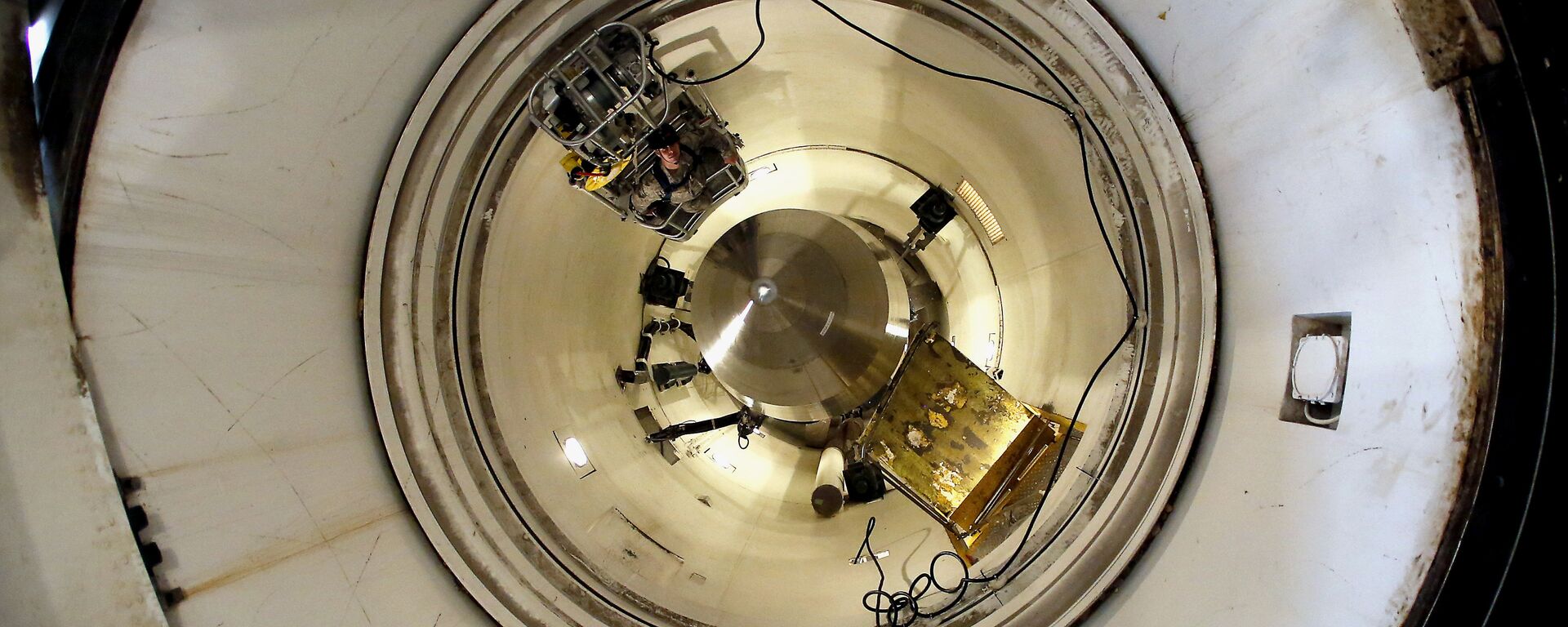https://sputnikglobe.com/20240522/deadly-chemicals-found-at-us-icbm-bases-threaten-to-send-personnel-to-early-grave-1118587054.html
Deadly Chemicals Found at US ICBM Bases Threaten to Send Personnel to Early Grave
Deadly Chemicals Found at US ICBM Bases Threaten to Send Personnel to Early Grave
Sputnik International
Minuteman IIIs went on duty in the 1970s, and have been plagued by the use of notoriously outdated tech, including computers using eight-inch floppy disks until as recently as 2019. Efforts to modernize the missiles have been problematic, with the Air Force forced to ‘safely terminate’ a test launch in November after detecting an ‘anomaly’.
2024-05-22T14:07+0000
2024-05-22T14:07+0000
2024-05-22T14:09+0000
military
titan
air force
minuteman iii
minuteman
cancer
https://cdn1.img.sputnikglobe.com/img/07e8/05/16/1118586417_0:30:1241:728_1920x0_80_0_0_23b819da99758b9f8626daf27101a327.jpg
Personnel operating current and former US ICBM bases have been exposed to cancer-causing agents known as polychlorinated biphenyls (PCBs), the Air Force has acknowledged.“PCBs are likely present in decommissioned Titan and Peacekeeper missile facilities that the Air Force no longer has the ability to conduct sampling in,” Air Force Global Strike Command chief General Thomas A. Bussiere said in a release put out earlier this week."One of the consistent concerns we've heard throughout the Missile Community Cancer Study is that service members, retirees, and veterans have trouble explaining their concerns over potential exposure to toxic chemicals with their healthcare providers, especially civilian providers who don't have access to military medical database," Air Force Global Strike Command Surgeon General Gregory Coleman said.They are extremely hard to break down or degrade, with elimination difficult and costly (incineration, for example, requires heating to temperatures of 1,000 degrees Celsius or above).The substances are linked to diseases impacting the central nervous system, and endocrine disruption. PCBs can also cause aggressive skin and liver cancers, and have a suspected role in the development of other ailments by weakening the immune system. They easily penetrate skin and even protective equipment, including synthetic polymers and latex.The US is expected to spend over $131 billion to replace its Minuteman III missiles with the new Sentinel missile program. The program has faced a string of delays and cost overruns, with the first test flight expected to take place in 2026 at the earliest.The Pentagon is expected to spend a staggering $1.5 trillion (and rising) on its multi-decade nuclear rearmament program - which was begun by the Obama administration in 2016.
https://sputnikglobe.com/20231223/us-may-forgo-deployment-of-antiquated-icbms-in-face-of-russias-avangard-missile-1115766416.html
https://sputnikglobe.com/20240327/cancer-incidence-mortality-after-nato-bombing-of-yugoslavia-still-on-rise---serbian-health-minister-1117571639.html
titan
Sputnik International
feedback@sputniknews.com
+74956456601
MIA „Rossiya Segodnya“
2024
News
en_EN
Sputnik International
feedback@sputniknews.com
+74956456601
MIA „Rossiya Segodnya“
Sputnik International
feedback@sputniknews.com
+74956456601
MIA „Rossiya Segodnya“
what are pcbs, are us icbm sites dangerous to operate, is it dangerous in a us missile base
what are pcbs, are us icbm sites dangerous to operate, is it dangerous in a us missile base
Deadly Chemicals Found at US ICBM Bases Threaten to Send Personnel to Early Grave
14:07 GMT 22.05.2024 (Updated: 14:09 GMT 22.05.2024) Introduced into service in the 1970s, America's Minuteman III ICBM arsenal has been plagued by notoriously outdated tech, including computers using eight-inch floppies until the late 2010s. Efforts to modernize the missiles have been problematic, with the Air Force forced to ‘safely terminate’ a test launch in November after detecting an ‘anomaly’.
Personnel operating current and former US ICBM bases have been exposed to cancer-causing agents known as polychlorinated biphenyls (PCBs), the Air Force has acknowledged.
“PCBs are likely present in decommissioned Titan and Peacekeeper missile facilities that the Air Force no longer has the ability to conduct sampling in,” Air Force Global Strike Command chief General Thomas A. Bussiere
said in a release put out earlier this week.
But the pale yellow-colored, viscous substances have also been found at active Minuteman III sites. Bussiere said sampling “identified the continued presence of PCBs” at Minuteman bases “despite a comprehensive removal effort in the 1990s.”
"One of the consistent concerns we've heard throughout the Missile Community Cancer Study is that service members, retirees, and veterans have trouble explaining their concerns over potential exposure to toxic chemicals with their healthcare providers, especially civilian providers who don't have access to military medical database," Air Force Global Strike Command Surgeon General Gregory Coleman said.
"While this memorandum from Global Strike Command cannot capture the specifics of any individual Airman or Guardian's service in the missile fields, it can serve as a starting point for discussions and documentation of potential exposure," Coleman added.

23 December 2023, 12:11 GMT
PCBs are chemical compounds used in an array of old equipment, including electronics. They were banned in the US in the late 1970s, and worldwide in the early 2000s. They share characteristics with other persistent organic pollutants, easily contaminating the local environment, including rivers, soil, and farms.
They are extremely hard to break down or degrade, with elimination difficult and costly (incineration, for example, requires heating to temperatures of 1,000 degrees Celsius or above).
The substances are linked to diseases impacting the central nervous system, and endocrine disruption. PCBs can also cause aggressive skin and liver cancers, and have a suspected role in the development of other ailments by weakening the immune system. They easily penetrate skin and even protective equipment, including synthetic polymers and latex.
The US is expected to spend over $131 billion to replace its Minuteman III missiles with the new Sentinel missile program. The program has faced a
string of delays and cost overruns, with the first test flight expected to take place in 2026 at the earliest.
The Pentagon is expected to spend a staggering $1.5 trillion (and rising) on its multi-decade nuclear rearmament program - which was begun by the Obama administration in 2016.




